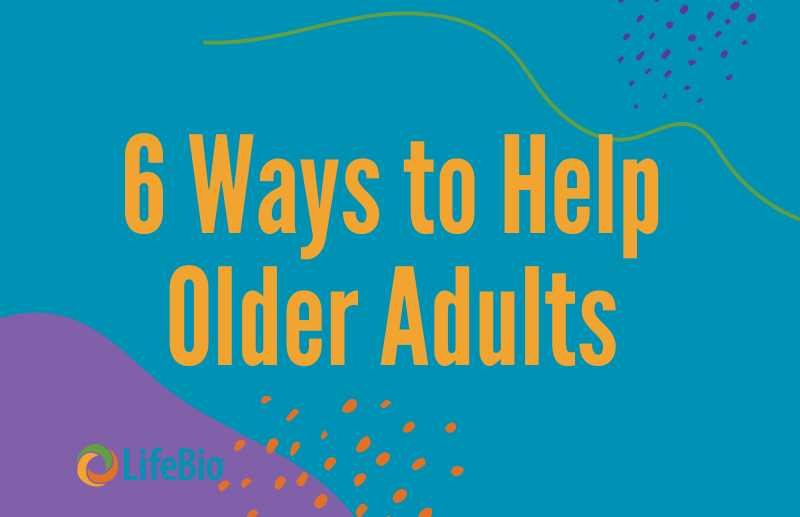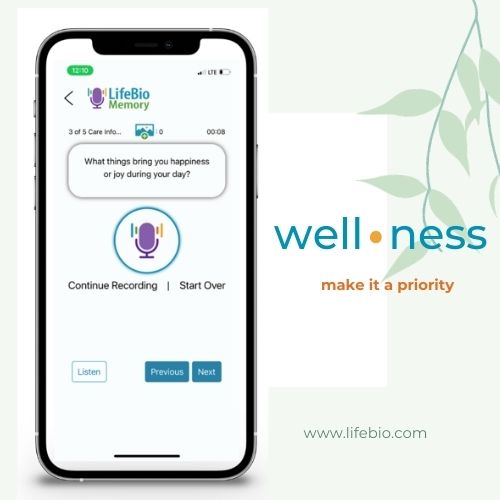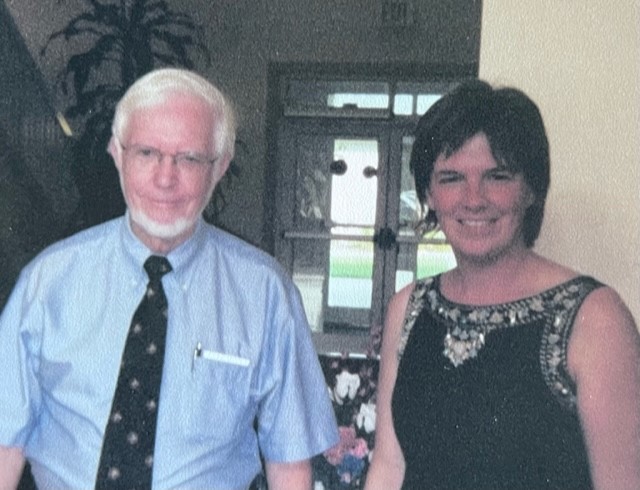CATEGORIES
RECENT POSTS
6 Ways to Help Older Adults January 24, 2024
LifeBio impacts wellness and helps people create a lasting LEGACY January 10, 2024
There was No One Else Like Richard July 02, 2023
TAGS
- create a legacy
- Life Story Program
- cognitive screening
- activities for dementia
- alzheimers
- cognitive testing
- Dr. Richard Morgan
- spiritual autobiography
- reminiscence therapy
- lifestories
- life story
- lifebio
- alzheimer's
- Alzheimer's
- Dementia
- Depression
- Journals
- Legacy
- MyHello Line
- Person-centered care
- Positive Brain Health
- Recall
- Remember
- Reminiscense Therapy
- RT
- senses
- What's Your Story?
- Record life stories
- combat loneliness
- personalized medicine
- occupational therapy and reminiscence therapy
- life stories for hospice patients
- life stories for palliative care
- partnership
- 2022
- post-covid
- workforcecrisis
- Loneliness Intervention
- sdoh
- lifestory
- agetech
- LifeBio research
- memorial day
- A Veterans Story
- world war ii
- Social Connectedness
- farfromalone
- interview mother
- mother's day
- Longevity, Health, & Innovation
- lifebiobrain
- MyHello
- healthtech
- conscious aging
- growing older
- vietnam veterans life stories
- vietnam
- national vietnam war veterans day
- deuce and a half
- army
- vietnam war
- veterans day
- vietnamtruckdriver
- vietnam truck driver
- veterans administration
- vietnam veterans and health care
- true love
- narrative spirituality and aging
- life story work
- reminiscence therapy activities
- friendship model
- build relationships
- love your neighbor
- keep going
- seniors
- loneliness
- Overcome
- Motivation
- Teepa Snow
- startuphealth
- StartUp Health Magazine
- LOVE STORY
- LifeBio
- LifeBio Memory
- LifeBio ALZ
- Family Stories
- Thanksgiving
- National Family Stories Month
- Reminiscing
- Keep the conversation going
- Dewey K
- Clarendale of Mokena
- Life Story
- Veteran
- National Alzheimer's Awareness Month
- National Family Caregivers Month
- LifeBioALZ
- nostalgia
- alzheimers disease
- digital therapeutic
- memory care
- dementia care
- nonpharma solutions
- healthy aging
- life stories
- legacy
- healthy aging month
- using reminiscence in health care
- using reminiscence in hospice
- volunteer programs for long-term care
- sister
- sisters
- friends
- biography
- autobiography
- story
- stories
- real
- biographical stories
- farm life
- raising butterflies
- teacher
- teaching
- true
- write
- writing
- career
- nurse
- medical
- job
- work
- Loneliness
- Isolation
- Solitude
- Aging
- Planting seeds
- Growing Family
- Apple Tree
- innovator's pitch challenge
- life science nation
- mary furlong & associates
- What's Next Longevity Venture Summit
- Sense of Time
- Not too late
- what will you do with your time
- Save family stories
- Online biography
- Sharing family stories
- covid-19
- pandemic
- isolation
- hope
- telephone interviews
- lifebio online options
- Guideposts article
- Benjamin Rose Institute on Aging
- living legacy
- family history
- telling your story
- Biography
- For people living with Alzheimer's or dementia
- Record memories
- quality care for memory loss
- love
- life
- meaning
- Fun at Work Day
- Coffee Cup
- How to fill your cup
- I choose happiness
- Storytelling
- LifeBio Reminiscence Method
- Innovator's Pitch Challenge
- IPC
- 39th Annual JP Morgan Healthcare Week
- Positivity
- Gratitude
- Blessings
- New Years resolutions
- Goals
- Happy New Year
- 2020
- New Year 2021
- Remembering 2020
- Hindsight is 2020
- To auld lang syne
- to days gone by
- Artificial Intelligence
- Northwestern University Master of Science in Artificial Intelligence 2020
- LifeBio Cares
- The Gables
- Messages of Hope
- LifeBio Book Covers
- New LifeBio Book Cover Designs
- Mourning the loss
- Christmas story
- personal story
- Life stories in health care
- reminiscence and health care
- Psychiatrist Dr. Robert Butler
- Life as story
- storytelling as self-discovery
- reminiscence
- reminscence with memory challenges
- overcome loneliness
- LifeBio Memory Journal
- Narrative as social connector
- Storying Later LIfe G. Kenyon
- The Narrative Complexity of Ordinary Life by W. Randall
- Celebrate holidays while socially distant
- Celebrate christmas while quarantined
- creative ways to celebrate holidays
- Playing Games over videoconference
- Tell life story
- Christmas gift ideas for elderly
- Connect through Music
- reminisce
- Social engagement
- brain health
- social brain
- thanksgiving
- give thanks
- gratitude
- Family Caregivers
- Caregivers
- Care for Caregivers
- Military
- Veterans Life Story
- history
- WWII
- Small Business Innovation Research grant
- SBIR grant
- National Institute of Aging
- Research Roundup
- Reminiscence
- remember
- memories
- life stories in senior living
- life biography
- Success Stories
- Caring for caregivers
- Family
- extended family
- immediate family
- family memories
- certification
- Women Owned
- National Women's Enterprise Business Certification
- Women's Business Enterprise National Council
- WBENC
- interesting
- social isolation
- meaningful interaction
- social distancing
- positive thinking
- positivity
- reminiscing
- Memories
- Dogs
- Pets
- Music therapy
- Reminiscence therapy
- Life story
- Olympics
- getting started
- sharing life stories
- Family stories
- Remembering
- Life stories
- cycling
- cycle
- bicycle
- bike
- ride
- MyHelloLine
- Changing Lives
- Intervention
- Telephone calls
- Group calls
- Person to Person Calls
- Check in calls
- Amy's Story
- Bev's Story
- Social Calls for seniors
- Senior Citizen daily calls
- Communications with seniors
- Reminiscing questions
- Connected living
- Intergenerational
- Student Intern calls
- Summer memories
- phrases
- constellations
- dogs
- reminiscing memories
- remembering
- good questions to ask
- my lasting legacy
- reminiscing questions
- Fourth of July
- July 4th
- 4th of July
- Cookout
- Parade
- Fireworks
- Celebrate
- Celebration
- Get-togethers
- Family gatherings
- Family reunion
- Patriotic
- Picnic
- Veterans
- Bonfire
- Firecracker
- Beach
- Independence Day
- Traditions
- Autobiography
- Reminiscing memories
- Family history
- Personal Historian
- My lasting legacy
- Holiday memories
- Emotional Wellness
- Redemption Stories
- Resiliency
- Online templates
- senior living communities
- emotional well-being
- Memory care
- Self-care
- Stress reduction
- Inner strength
- Self-awareness
- Positive thinking
- Resilience
- Brain science
- Meditation
- Self-affirmation
- Mindset
- Stress management
- Connectivity
- Avoid Social Isolation
- Decrease Depression
- Spanish calls
- English calls
- Encore
- Gateway Community Action
- Foster Grandparents
- Gateway Foster Grandparents
- Father's Day
- Making Decisions
- Telling Your Story
- Sharing Accomplishments
- Giving Advice
- Avoid Head Injuries
- Brain Health
- Cognitive Decline
- Diet
- Exercise
- Healthy Alcohol Consumption
- Journal
- Mental Stimulation
- Reminiscence Therapy
- Sleep
- Social Contacts
- Wellness Checks
- Writing
- Decoration Day
- Honor Fallen
- How Will You Celebrate
- Memorial Day
- Memorial Day History
- Not Forgotten
- Poppies
- Remember Their Stories
- Ultimate Sacrifice
- What is Memorial Day
- Adversity
- Advice
- Facing Hardships
- History
- Sharing Your Story
- Unique Story
- Free Conversation Group
- Phone Call
- Zoom Call
- Communication Tips
- How to Act
- How to Ask Questions
- How to Respond
- How to Speak
- Positive
- Preparation
- Reminisce
- What Not to Say
- What to Say
- Beth Sanders
- Covid-19
- Logan Plaster
- YouTube interview
- gifts
- Laurel's story
- Mom
- Mother's Day
- Ask yourself
- Connect
- Covid-19 response
- Creativity
- Healthy body
- Healthy mind
- Move
- Outside
- Quarantine
- Self-isolation
- Six Questions
- Social distancing
- acknowledge
- coronavirus
- distance
- eye contact
- isolated
- wave
- Care packages
- Creative Ideas
- Letters
- Memberships
- Music
- Photos
- Share Memories
- Show and Tell
- Videoconference
- What's Your Story? cards
- How to
- Tutorial
- Typing your story
- Using LifeBio website
- Audio Recording
- Document a life story
- Family tree
- Save photos
- Tell a Life Story
- Write a Life Story
- Your Love Story
- Personalized Story
- Sharing your story
- Storymaker
- Storyteller
- Storytelling quotes
- dementia
- phone communication
- telephone questions
- Connecting
- Conversation Starters
- Coronavirus Response
- Covid-19 Response
- Epidemic
- Meaningful Interaction
- Social Distancing
- Social Isolation
- Biographical Stories
- Capture Your Story
- Mental Health
- Social Interation
- Writing Prompts
- Friendship
- REMINISCE
- TELL YOUR LIFE STORY
- UNIQUE VALENTINE'S DAY GIFT
- VALENTINE'S DAY
- butcher shop
- errands
- Illinois
- My Life Story
- Writing Your Story
- Biography Examples
- How do I write my biography
- How to write a biography
- Where to wite my biography
- Free biography
- How to write my story
- Write my story
- Music Therapy
- Music Therapy Services
- senior health care services
- Person Centered Care Services
- hungary
- veteran story
- russion gulag
- Home
- GI
- letter
- Lonely
- tips for overcoming loneliness
- Story
- Life Stories
- Naidex
- how to write a biography
- how to write an autobiography
- personal biographer
- tell your story
- writing a biography
- writing an autobiography
- activities
- grandchildren
- grandparents
- sharing your story
- tell your life story
- active aging
- Healthcare
- health care
- senior living
- skilled nursing
- volunteering
- wellness
- activities for senior living
- Activity
- Elderly
- Seniors
- activities for the elderly
- activity directors
- person centered care
- wellness for seniors
- Christmas
- Kesges
- happy
- memory
- cow
- dog
- cat
- pet
- favorite
- elvis
- presley
- famous
- Autobiography template
- sample autobiography
- writing an autobiography made simple
- about me
- children's hospital
- genealogy
- journaling
- kids
- narrative exposure therapy
- teens
- terminal illness
- ethical will
- heartfelt letter
- if I die letter
- letter to my loved ones
- priceless gift
- the ultimate gift
- Alzheimer's disease
- memory book
- memory loss
- interviewing a veteran
- questions to ask a veteran
- veteran's life story
- veterans day activities
- veterans history project
- writing a veterans life story
- reminiscence is therapeutic
- therapeutic reminiscence
- last wwi veterans dies
- wwii veterans life stories
- dementia activities
- dementia therapy
- memory care activities
- reminiscence in memory care
- memory books to capture this is my life
- this is my life in retirement communities
- how do I tell my grandma's life story?
- biography template
- write my biography
- writing my biography
- how do i interview my mother my father my grandma my grandpa
- 5 tips for writing an autobiography
- if i die
- ifidie
- recording christmas memories
- writing christmas letters
- writing christmas stories
- fdr speech about pearl harbor
- pearl harbor attack remembered
- pearl harbor speech
- 10xelerator
- Fisher College of Business
- The Ohio State University
- wakeup startup
- veterans story
- best holiday gifts for grandparents
- top holiday gifts for grandma 2011
- top holiday gifts for grandpa 2011
- what should I get my grandparents for christmas?
- best gifts for financial advisors to give to clients
- financial advisor client gifts
- gifts under $20 from financial planners
- holiday gifts for financial advisors
- 10 years after September 11
- 2001
- memories of September 11
- mother's memory of Sept. 11
- people in ohio remember september 11
- true colors lyrics
- creative assisted living
- creative retirement
- retiring in an rv
- veterans biography questions
- veterans day program ideas
- veterans story book
- veterans storybook
- wwii veteran life stories
- pat summitt basketball coach
- lifebio iphone
- lifebio mobile
- intergenerational programming
- intergenerational programming in nursing homes
- intergenerational programming in senior living
- intergenerational programs in churches
- life stories in retirement communities
- technology for retirement communities
- technology solutions for senior living
- journaling for people with memory loss
- journaling for PTSD
- journaling health benefits
- journaling to help with depression
- memory books for alzheimer's
- aarp video
- amazing videos
- generation y video
- lost generation
- reminiscence and brain fitness
- rethinking reminiscence
- ageism
- baby boomers aging
- dr. bill thomas
- memorial day for veterans
- memorial day program ideas
- veterans stories
- adult day programming for retirement communities
- cognitive impairment in retirement communities
- memory care curriculum
- lifebio.com
- online autobiography template
- alzheimer's and boomers
- alzheimer's disease facts
- standup gardens
- great gift ideas for mother's day 2011
- life story journal
- memory books for mother's day
- memory gift box
- memory journal
- she calls me raymond
- how to create a lasting legacy
- ice cream memories
- life story classes
- life story writing
- storycorps mobile booths
- storycorps oral history
- studs terkel
- how to write life stories of my grandparents
- interviewing dad
- interviewing grandma
- interviewing grandpa
- interviewing mom
- geriatric psychiatry and life stories
- intergenerational communications
- advantages of storytelling
- my life story
- storytelling around the campfire
- storytelling for grandparents
- storytelling for parents
- storytelling to our children
- storytelling to our grandchildren
- unique 70th birthday gifts
- unique 80th birthday gifts
- unique birthday gifts for seniors
- earthquake and tsunami relief
- volunteers capturing life stories
- volunteers doing oral history interviews
- statistics on aging
- activities for grandparents and grandchildren
- grandma's life stories
- grandpa's life stories
- memories of grandparents
- tell us a story grandma
- tell us a story grandpa
- activities for grandparents
- baby books and grandparents
- recording memories for grandchildren
- creating a lasting legacy
- ethical will template
- legacy letter
- writing my life story
- frank buckles dies
- wwi veteran death
- brain fitness and dementia
- dementia care tools
- reminiscence therapy and dementia
- reminiscence therapy tools
- the notebook and dementia care
- capture life stories
- capture your own life story
- example of life stories
- rehab therapy and reminiscence therapy
- rehabilitation therapy and reminiscence therapy
- speech therapy and reminiscence therapy
- person-centered care
- eden alternative
- eden at home
- living with dementia
- memories of elders
- activities for adult day care centers
- adult day care activities
- ideas for activities in adult day programs
- journaling with dementia patients
- capturing memories
- how to talk with older people
- loneliness in boomers and seniors
- writing my memoir
- writing your life story
- intergenerational projects for kids
- intergenerational projects for teenagers
- intergenerational projects for teens
- intergenerational projects for youth
- autobiography class for libraries
- autobiography writing group
- autobiography writing group in libraries
- daptive technology for assisted living
- adaptive technology for skilled nursing
- computers for assisted living
- computers for nursing homes
- technology for nursing homes
- activities for alzheimer's
- activities for memory care
- alzheimer's activities
- life stories in memory care
- conversation starter games
- family gathering games
- family reunion games
- games for a reunion
- reunion games
- shower games
- memories lost or forgotten
- record memories for people with alzheimer's disease
- record memories for people with dementia
- autobiography class for all ages
- autobiography class for older adults
- autobiography class for seniors
- reminiscence therapy for alzheimer's patients
- writing down memories for alzheimer's patients
- record your life stories
- record your life story
- bible studies for boomers
- bible studies for seniors
- bible study for boomers
- bible study for seniors
- intergenerational Bible study
- interview your grandparents
- snow day activities
- snow day activity
- what can teenagers do when school is closed
- overcoming hate with love
- problem solving
- world peace
- personal historian in ohio
- life story curriculum for memory care
- reminiscence curriculum for alzheimer's disease
- activities for early-stage alzheimer's
- life stories for early-stage Alzheimer's disease
- reminiscence for early-stage alzheimer's disease
- life review and reminiscence for people with alzheimer's
- memory books for people with alzheimer's
- reminiscence therapy for people with alzheimer's
- storytelling for people with dementia
- life stories work and social work
- social work and life stories
- social workers and life stories
- using reminiscence in social work
- life review and social work
- life stories and geriatric care management
- listening is an act of love
- tips for writing life stories
- activities with grandchildren
- how to make bread
- tips for baking bread
- create a memory book
- family life stories
- life story book
- world war ii stories
- life stories of parents
- oral history interview
- recording parents
- writing dad's life story
- writing mom's life story
- life stories in long term care
- life stories in nursing homes
- video recording in senior living
- writing autobiographies in senior living
- best gift ideas
- christmas gifts
- gifts for dad
- gifts for grandma
- gifts for grandpa
- gifts for mom
- gifts for parents
- hanukkah gifts
- wellness director
- wellness programming
- wellness trends
- ethical will kit
- how to write an ethical will
- legacy letter kit
- writing an ethical will
- life bio journal
- writing my autobiography
- teaching children how to work
- tips for teaching hard work
- volunteer experiences for kids
- what is an ethical will
- autobiography template
- activities in retirement communities
- new programs for retirement communities
- intergenerational programs in libraries
- libraries and family history projects
- oral history projects in libraries
- norman rockwell memories
- sweet memories
- best client gifts
- best gifts for financial planners to give to clients
- top 3 client gifts
- reminiscence and psychiatry
- reminiscence and psychology
- life story journals
- life story tools
- memory training program
- life stories for senior living
- new activities for nursing homes
- new activities for skilled nursing
- oral history tips
- veteran's story
- activity program in long term care
- assisted living
- activities for nursing homes
- autobiography classes for seniors
- computer programs for seniors
- autobiography for hospice patients
- biography for hospice patients
- reminiscence therapy for hospice patients
- activities for seniors
- ICAA successful programs for older adults
- wellness programs for older adults
- financial advisor gifts
- financial planner gifts
- gift ideas for clients
- conducting an oral history
- oral history recording
- reminiscence therapy for recreation therapy
- oral history questions
- tools for reminiscence therapy
- aarp
- activity programs for seniors
- great depression
- great recession
- video recording a biography
- video recording kit
- 3 tips for activity directors
- activity connection
- activity ideas
- aging and wellness
- brain fitness
- retirement
- social engagement
- narrative care
- narrative medicine
- innovative activity program
- lifelong learning
- 4 tips for activity directors
- long term care activities
- reminiscence therapy tool
- wellness program
- brain fitness and memory care
- memory care program
- memory care programming
- reminiscence and memory loss
- memory care programs
- retirement community memory care
- brain fitness and reminiscence
- reminisce magazine
- retirement communities
- biography book
- personal history
- dementia programming
- memory book for alzheimer's
- reminiscence and life review
- autobiography how to
- dr. barry baines
- life story gift
- treasures of the heart
- group biography class
- uided autobiography class
- life review classes
- senior center classes
- guided autobiography
- home health and reminiscence
- reminiscence and hospice
- older americans month
- online autobiography
- write autobiography
- writing a memoir
- writing memoir
- motivational interviewing
- caregiver communication
- gerontology
- tips for writing an autobiography
- journal of memories
- unique graduation gift
- autobiography of mom
- family celebrations
- family history and genealogy
- family reunion fun
- association of personal historians
- oral history
- oral history genealogy
- fun with grandkids
- grandchildren activities
- memory journals
- caregivers
- caregiving
- family reunions
- icaa
- masterpiece living
- keepsake autobiographies
- keepsake journal
- memory books
- senior activities for activity directors
- senior living programs
- wellness programs for seniors
- building community
- friendly visit
- friendly visit ideas
- friendly visiting program
- senior service innovations
- CCRC
- disorientation
- geriatric depression
- retirement community
- brain fitness programming
- retirement communities and brain fitness
- retirement communities and wellness
- autobiography classroom project
- emotional intelligence
- social and emotional education
- products for older adults
- asa
- boomer summit
- chicago
- 7 tips for writing your autobiography
- genealogy journal
- telling my life story
- tipe for writing autobiography
- how to autobiography
- Boy Scouts of America
- phone recording interviews
- Interview grandma
- interview grandpa
- capture memories
- travel journal
- positive aging
- how to create a memory book
- how to record life stories
- intergenerational oral history
- recollections
- how to interview dad
- interview mom
- interview parents
- cheap autobiography
- easy autobiography
- aging
- biography writer
- writing autobiography
- phone recording
- write your life story
- aarp lifestyles
- writing biography
- autobiography writer
- personal historians
- older adult ministry
- youth group ideas
- creative memories
- life stories in churches
- unique bible study
- digital scrapbooking
- write a book
- national day of listening
- storycorps
- eid
- Hanukkah
- memorable gifts
- unique gifts
- neurology
- interviewing grandparents
- interviewing parents
- retirement living
- audio recording
- recording memories
- autobiography gift
- gift of autobiography
- active aging week 2009
- international counceil on active aging
- end of life
- living will
- biography gift
- how to write an autobiography video
- interview dad
- unique gift of autobiography
- interview father
- interview grandparents
- grandparents memories
- aahsa
- life care services
- celebration of life
- funerals
- life celebration
- memory book for dementia
- scrapbooking
- write biography
- Baby boomer marketing
- David Weigelt
- ImmersionActive
- marketing to baby boomers
- social media
- autobiography book
- reunion
- Lifebio certified community
- twibes
- $1
- 000 contest
- tell your life story contest
- tell your story contest
- interviewing father
- interviewing mother
- life sto
- unique father's day gift
- unique mother's day gift
- baby boomers
- social capital
- marketing events
- outreach events
- speaker
- amazing stories
- autobiography classes
- classes for seniors
- intergenerational class
- older adult curriculum
- reminiscence classes
- easter
- family gatherings
- father's day
- gift of memories
- family stories
- generations
- DIY autobiography
- do-it-yourself autobiography
- genealogists
- 50+ ministry
- boomer ministry
- building small groups
- older adult ministries
- senior ministry
- press room
National Family Caregivers Month
Posted On: 19 November, 2020
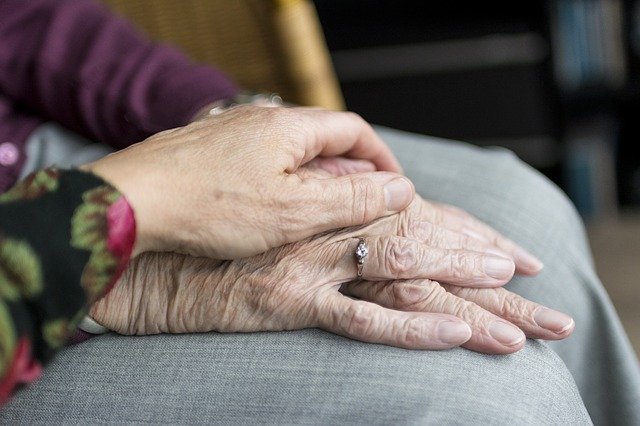
November is National Caregivers Month, a time to recognize, celebrate, and honor family caregivers. Caregivers are everyday heroes who live amongst us. They serve selflessly and often make sacrifices. Family caregivers devote countless hours to care for loved ones, and they humbly help keep families and communities strong.
While all family caregivers are worthy of respect, they do not all play the exact same role. Some family caregivers are just beginning, while others have been providing care for years. Some family members may be helping provide care from a distance, while others care for someone living in the same home. Some are full-time family caregivers, while many hold outside jobs at the same time. Almost half are caring for a parent, while about a fifth care for a spouse, and others are caring for a child or other family member.
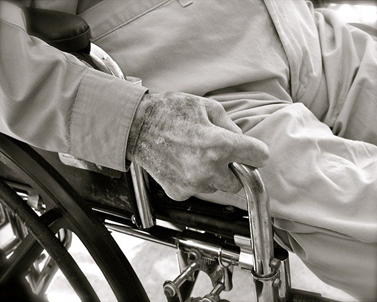
Caregiving can take on many forms. It may mean sitting and visiting with someone. For others it may mean giving a bath and helping with personal hygiene. Some caregivers may help with shopping or cleaning someone’s home. Some may administer medications and help with specific medical care. Others may prepare or help serve meals. Some may aide loved ones with other tasks they can no longer complete alone, such driving or making sure bills are paid.
Family caregivers provide 90% of long-term care in the United States. There are over 53 million unpaid caregivers to family, friends, and neighbors. Twenty-seven percent of adult caregivers aid people with a mental illness. Over half of family caregivers are women. Over one million American young people (ages eight to 18) provide care for an adult relative on a daily basis. About one quarter of caregivers are 18-to 34-year olds, and nearly another quarter are 35 to 49. More than a third of caregivers are 50 to 64 years of age, and seven percent are over the age of 75. Approximately 21% of caregivers are Hispanics, 20% African Americans, 19% Asian Americans, and 17% Caucasians. More than a quarter of all caregivers care for an adult family member, while also raising children at home.
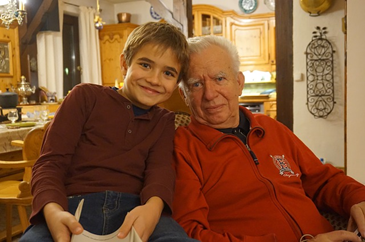
The loved ones in need of family caregivers are just as varied as the people providing care. Some are living with diseases such as Parkinson’s or Alzheimer’s. Some are fighting cancer or long-term illnesses. Others are veterans dealing with injuries or PTSD. Some may be elderly who live alone but benefit from occasional check-ins. Some are learning to recover from strokes or other health problems. Others may be battling mental illnesses. Some may be overcoming addictions.
Caregiving can significantly impact the caregiver’s life in numerous ways. It can be a challenge to maintain one’s own physical, mental, and emotional health while also caring for another person. Caregiving can put a strain on your home life, social life, and work life. This role may cause feelings of stress, worry, anxiety, or depression.
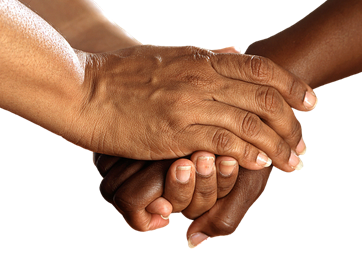
Caregivers also deserve to have care and a support system. Knowledge and support can make caregiving easier. Some caregivers report that praying and meditating helps cope with stress. For 44%, reading books about caregiving and visiting supportive websites can help give a sense of community and help to manage daily frustration. Others prefer to join support groups, whether in person or online, to find people that they can best relate to.
The Caregiver Action Network (CAN), is a nonprofit that provides free education, peer support, and resources to family caregivers. The National Alliance for Caregiving (NAC) has the goal to be a resource on family caregiving that can improve the quality of life for families. The National Family Caregivers Association (NFCA) provides yet other free resources while supporting and empowering caregivers. Mental Health America offers free, anonymous, and confidential mental health screenings for caregivers. The National Volunteer Caregiving Network (NVCN) may be able to provide other programs and resources near you.

LifeBio thanks the millions of family caregivers in America for the priceless care they provide! We encourage caregivers to use the support systems and resources available to them. Finally, if you know a caregiver, reach out to encourage and support them as you are able, especially this month. Caregivers can not pour from an empty cup, so to speak, so it is crucial that their own cups are also being filled. (Click here for more tips on care for caregivers.)

